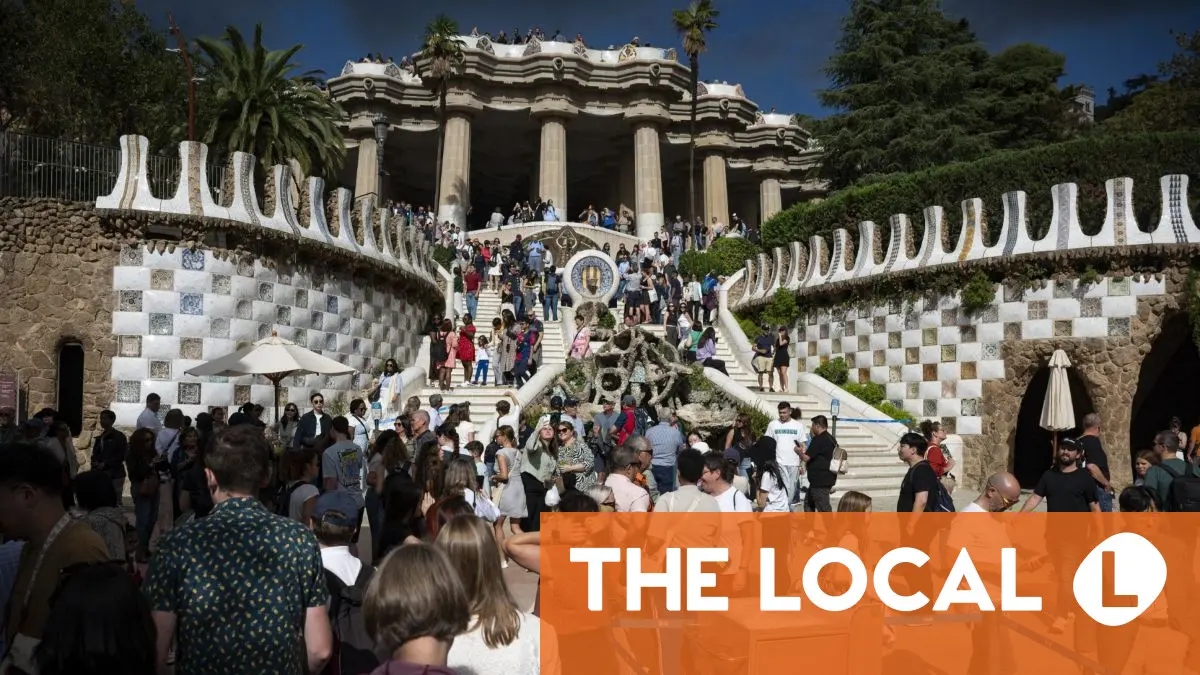Inside Spain: Why Barcelona's new tourism crackdown doesn't convince locals

In this week's Inside Spain, we look at why the decision to limit visitor numbers at Barcelona's overcrowded Park Güell has been shrugged off as a "distraction tactic" by disgruntled locals.
Spain’s most touristy city continues to look for ways to crack down on overtourism, albeit not too drastically.
Barcelona City Council approved this week a gradual reduction of the annual visitor number limit at Park Güell to a maximum of 4 million.
That's half a million fewer visitors than the current 4.5 million, scaled down slowly over the next two years.
The initiative was presented by left-wing ERC, which convinced city hall to put the proposal to a vote, and it received the support of all parties except the centre-right PP.
Barcelona city councillor Jordi Valls defended slashing Park Güell numbers as it will allow them to "deepen the strategies already outlined for tourism management."
"We know residents consider it insufficient, but we're making an initial push for improvement that will undoubtedly benefit residents," said ERC councillor Jordi Coronas.
Even though the measure will result in 1,300 fewer daily visits to Park Güell by 2027, neighbours have labelled it as “not ambitious enough” and a “distraction tactic”, arguing that the numbers should instead be slashed by half to 2 million.
For Barcelona University urban anthropologist José Mansilla, "presenting a drop in visitors to Park Güell as progress in reducing tourism is a fallacy".
"Where will the visitors go instead if they don't go to the park?" he told local site Tot Barcelona.
"Because they will still be in Barcelona".
READ ALSO: 'Bring your water pistols' - Barcelona braces for tourism demo
Authorities in the Catalan capital have for years now been trying to strike a balance with the multifaceted problem of overtourism, the driving force of the Catalan economy but one that’s had a major impact on the quality of life and social fabric of Barcelona.
After all, data from Barcelona’s Tourism Board indicates that the economic activity generated by this industry in the city amounts to €15 billion, and that if all tourists were to leave, Barcelona would lose 14 percent of its GDP.
City hall has also previously agreed to put up the price of Park Güell tickets as a dissuasive measure, decided to reduce the number of cruise ship terminals, vowed to get rid of ‘tacky’ souvenir shops from the city centre, prevented new tourism apartments from being set up, promised to completely get rid of all short-term lets by 2028, put up tourism taxes and more. Some of these measures have been executed, others are in the pipeline.
What’s clear is that as things stand, little has changed for locals, who feel like they continue to live in a theme park for tourists and that they’re second-class citizens.
Perhaps the measure that could have the biggest impact for Barcelona residents is the scrapping of all short-term rentals by 2028, as it’s housing more than any other aspect that is truly causing frustration in Barcelona and across Spain.
Nowadays, you’re lucky enough to be able to afford a room in Barcelona, let alone your own studio apartment.
READ ALSO: Three quarters of rental ads in Barcelona are for rooms
Then again, is there any certainty that such an extreme move will have the intended consequences of putting tens of thousands of homes back on the long-term rental market at affordable rates, and reduce property purchasing prices too in the process?
This will largely depend on how landlords and property owners decide to react.
Spain’s 2023 national Housing Law is a good example of this. Designed to regulate rental prices, two years on most analysts consider it to have failed and made Spain’s housing problems even worse.
Can Barcelona look elsewhere for inspiration when finding the right balance that addresses both overtourism and the housing crisis? Not currently, its only choice is to be a pioneer.
Please sign up or log in to continue reading
thelocal





